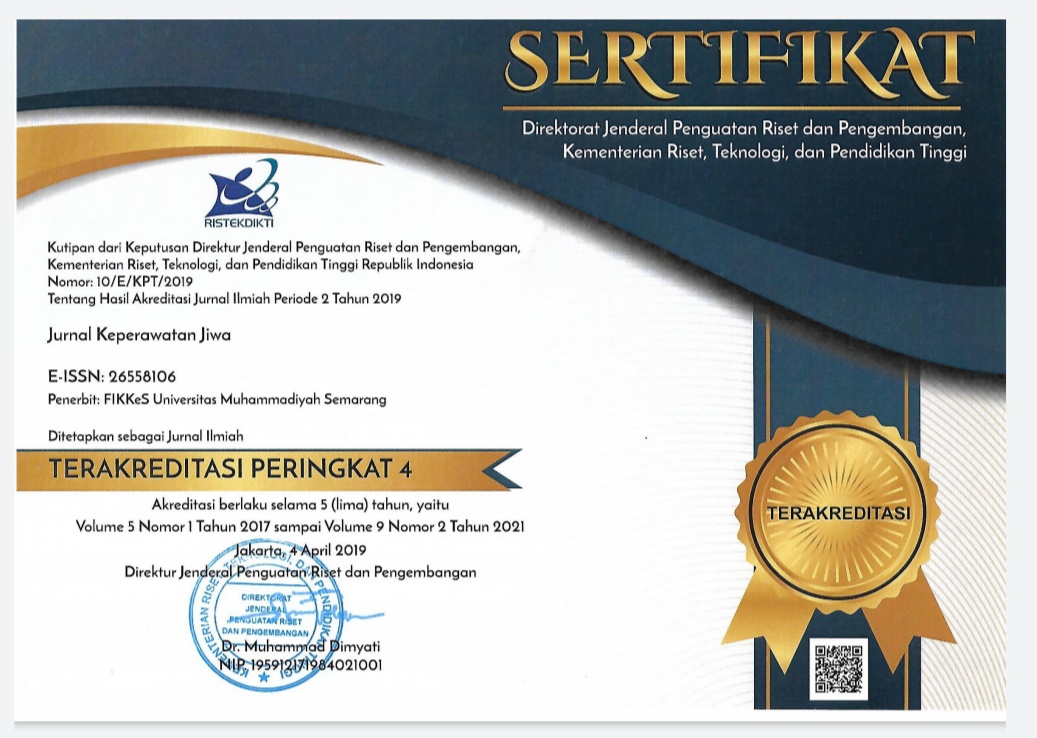Posyandu Model for Children Based on Stimulus Growth using the UCIL Method Influences on the Level of Mother's Knowledge
(1) STIKES Notokusumo Yogyakarta
(2) STIKES Notokusumo Yogyakarta
(*) Corresponding Author
Abstract
Keywords
Full Text:
PDFReferences
Adriana. (2001). Tumbuh Kembang Dan Terapi Bermain Pada Anak. Salemba medika.
Aticeh., Maryanah., S. S. 2015. (2015). Pengetahuan kader meningkatkan motivasi dalam melakukan deteksi dini tumbuh kembang balita. Jurnal Ilmu Dan Teknologi Kesehatan., 2(2).
Depkes. (2011). Pedoman Pengelolaan Posyandu.Jakarta
Hendrawati, S., Mardhiyah, A., Mediani, H. S., Nurhidayah, I., Mardiah, W., Adistie, F., & Maryam, N. N. A. (2018). Pemberdayaan Kader Posyandu dalam Stimulasi Deteksi dan Intervensi Dini Tumbuh Kembang (SDIDTK) pada Anak Usia 0 – 6 Tahun di Desa Cileles Kecamatan Jatinangor Kabupaten Sumedang. Media Karya Kesehatan, 1(1), 39–58. https://doi.org/10.24198/mkk.v1i1.17263
IDAI. (2013). Kurva Pertumbuhan WHO. http://childrenclinic.wordpress.com/.
Judarwanto, W. (2009). Deteksi dan stimulasi dini tumbuh kembang dalam 1000 hari pertama (Bahan pelatihan SDIDTK). http://childrenclinic.wordpress.com/.
Kemenkes. (2015). Pedoman Pelaksanaan Stimulasi,Deteksi dan Intervensi Dini Tumbuh Kembang Anak di Tingkat Pelayanan Kesehatan Dasar.
Kharisma, M., & Efni, N. (2017). Hubungan Pengetahuan Ibu Tentang Tumbuh Kembang Dengan Perkembangan Anak Usia 3-4 Tahun Di Kelompok Bermain Golden Kids Di Kecamatan Telanai Pura Kota Jambi. , Jurnal Akademika Baiturrahim. Vol 6. No.1. Maret 2017. http://jab.stikba.ac.id/index.php/jab/article/view/15.
Kusuma, R. (2012). Hubungan Antara Tingkat Pengetahuan Ibu Tentang Tumbuh Kembang Anak Dan Perkembangan Motorik Halus Balita Di Wilayah Kerja Puskesmas penumping surakarta. Naskah Publikasi. Fakultas Kedokteran. Universitas Muhammadiyah Surakarta.
Miskin, S. Rompas, S. Ismanto, A. Y. (2016). Hubungan Pengetahuan Ibu dan Peran Kader Dengan Kunjungan Balita di Posyandu Wilayah kerja puskesmas pineleng. E-Journal Keperawatan (e-Kp), 4(1).
Palasari, W., & Ika, D. (2012). Keterampilan Ibu Dalam Deteksi Dini Tumbuh Kembang Terhadaptumbuh Kembang Bayi. Jurnal Stikes, 5(1), 11–20. file:///C:/Users/User/AppData/Local/Temp/18465-21685-1-PB-1.pdf
Saputra.,wahyu., I. dan irdawati. (2011). Hubungan antara Tingkat Pengetahuan Ibu dengan Tumbuh Kembang Prematur Usia 6 sampai 12 Bulan Di Wilayah Kerja Puskesmas Sekecamatan Banjarsari. Naskah Publikasi.
Sistiarini, C., S. N. dan S. (2013). Faktor yang Mempengaruhi Peran Kader Dalam Penggunaan Kartu Kesehatan Ibu dan Anak. Jurnal Kemas, 8(2), 99–105.
Sotjiningsih, & Ranuh. (2015). Tumbuh Kembang Anak. EGC.
Syahailatun., J. dan K. (2020). Pengetahuan Ibu tentang Tumbuh Kembang Berhubungan dengan Perkembangan Anak Usia 1-3 tahun. Jurnal Biomedika dan Kesehatan. Jurnal Biomedika Dan Kesehatan, 3(2).
UNICEF. (2012). Inequities in Early Childhood Development: What the data say. Evidence from the Multiple Indicator Cluster Surveys. https://www.unicef.org/publications/files/Inequities_in_Early childhood_Development_LoRes_PDF_EN_02082012.pdf
Article Metrics
Abstract view : 254 timesPDF - 99 times
DOI: https://doi.org/10.26714/jkj.8.4.2020.541-550
Refbacks
- There are currently no refbacks.
PPNI Univ. Muhammadiyah Semarang
Jl. Kedungmundu Raya No. 18 Semarang Gedung NRC University of Muhammadiyah Semarang
Phone: 02476740287
Fax: 02476740287
Email: [email protected]
This work is licensed under a Creative Commons Attribution 4.0 International License.


